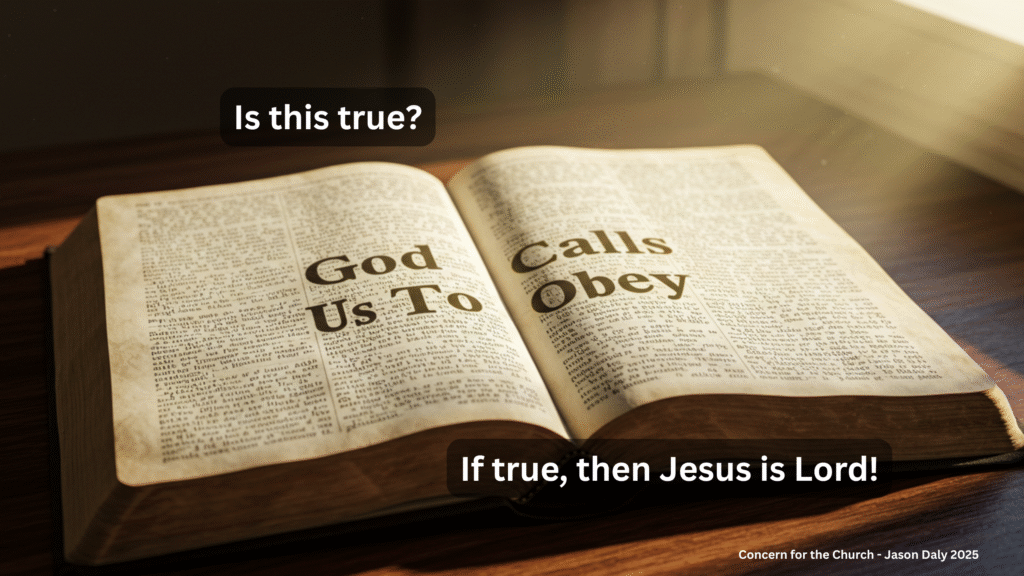The question of Jesus’ Lordship refers to the Christian belief that Jesus Christ is both divine and the ultimate authority over all creation.
The Lordship of Christ: A Call to Personal Reflection
Is Jesus truly Lord in your life? Or have you embraced a version of Him that’s easy to claim but harder to follow?
As I’ve reflected on this question over time, I’ve found myself wrestling with the reality of Christ’s Lordship—and how often we, as believers, fall into the trap of separating Christ’s salvation from His authority.
This post comes from my own ongoing journey—a journey I know many of you are also on. It’s born out of frustration and concern over the “non-Lordship” view that seems to be growing in popularity. And while my thoughts on this issue were recently stirred by Phil Johnson’s sermon “Jesus Calling,” this is less of a critique and more of an honest reflection on my own walk with Christ.

Not Listening
The phrase ‘Lordship Salvation’ is frequently misunderstood and quickly mislabeled, a regrettable outcome that suggests the term itself was ill-conceived. While ‘believe in Jesus and become His student, learning from Him as your Master’ might capture the essence more accurately, it lacks the conciseness of a coined term. Perhaps ‘ Salvation Follows Jesus ‘ offers a more accessible and inviting alternative. This exploration delves into Phil Johnson’s message, ‘Jesus Calling,’ which presents a compelling and fresh understanding that could gracefully supersede the controversial ‘Lordship Salvation’ label.
Are You Really a Disciple? Unpacking Jesus’ Call to True Faith
Often, we hear the terms “Christian” and “disciple” used interchangeably. But are they truly the same? This article delves into a powerful message about the essential connection between belief and discipleship, inspired by the teachings of John MacArthur and grounded in the words of Jesus himself. Prepare to examine your heart and consider what it truly means to follow Christ.
The Gospel at the Core: MacArthur’s Passion
John MacArthur, a renowned pastor and theologian, consistently emphasized the centrality of the Gospel. He stressed the importance of understanding it correctly and passionately urged believers to examine themselves to ensure their faith was genuine. This stemmed from personal experience: witnessing friends who professed faith later abandon it. This concern fueled his ministry and became a recurring theme in his sermons and books, including his seminary thesis on Judas and lukewarm discipleship.
“How to Play Church”: A Warning from the Start
MacArthur’s very first sermon at Grace Community Church, titled “How to Play Church,” served as a stark warning to half-hearted believers. He challenged those who merely professed Christianity without a genuine desire to follow Christ. This message previewed themes he would later explore in depth in his books, “The Gospel According to Jesus” and “The Gospel According to the Apostles,” sparking important conversations about Lordship Salvation.
The Lordship Debate: Is Willingness to Follow Christ Essential?
The core question at the heart of the Lordship debate is this: Can someone have true saving faith without a willingness to follow Christ and submit to Him as Lord? MacArthur’s answer was unwavering: If you aren’t a disciple of Christ, you’re not a genuine believer.
“Jesus Calling”: A True Summons to Discipleship
Let’s turn to Matthew 11:28-30, a passage often referred to as “Jesus Calling,” a title borrowed from Charles Spurgeon (and not Sarah Young, whose book of the same name is not recommended due to its putting words in Jesus’ mouth). These verses offer a profound invitation to discipleship:
“Come to me, all who are weary and heavy laden, and I will give you rest. Take my yoke upon you, and learn from me, for I am gentle and humble in heart, and you will find rest for your souls. For my yoke is easy, and my burden is light.”
This passage reveals that discipleship is not a program or a seminar, but a fundamental aspect of the Christian life.
Understanding Discipleship: Beyond Programs and Mentors
The word “disciple” (from the Greek “mathetes,” meaning learner or student) implies a master-disciple relationship. In ancient Greek culture, a disciple would not only learn from his master but also follow him, imitate his conduct, and absorb his values. The master was both teacher and lord, holding authority over the disciple.
Therefore, true discipleship is akin to bondservanthood or even slavery to Christ. Jesus himself uses the image of a yoke to illustrate this commitment.
Making Disciples: Not Usurping Christ’s Role
When Jesus commanded, “Go therefore and make disciples of all nations,” He wasn’t asking us to become masters ourselves. Instead, we are called to bring others into a disciple relationship with Him, the one true Lord and Master.
It’s crucial to understand that:
- You don’t want to be my disciple. Model yourself after Jesus, not after flawed human beings.
- Discipleship is not about shirking responsibility. It’s not about finding someone to manage your spiritual life for you.
The Cost of Discipleship: Driving Away the Half-Hearted
Jesus’ teachings on discipleship were often designed to deter half-hearted followers. He sought quality, not quantity. He made it clear that following Him demands absolute surrender and a lifetime commitment.
The Catastrophic Misunderstanding: Discipleship is NOT Optional
Perhaps the biggest misconception today is the idea that discipleship is optional, an advanced program for “elite” Christians. This is simply not biblical.
- Jesus called people to faith in Him as disciples.
- There is no dichotomy between believers and disciples.
- If you weren’t a true disciple, you weren’t considered an authentic believer.
The early church understood this. In Acts, believers were routinely referred to as “disciples.” Therefore, there is no such thing as a true believer who is not also a disciple.
Jesus is Lord: The Most Basic Confession
Saving faith is not merely admiring Jesus or adding Him as a spiritual accessory. It’s a full embrace of all that Jesus is in His divine authority, necessarily involving full surrender to that authority.
- The most basic Christian confession is that “Jesus is Lord.”
- This confession cannot be made genuinely without the Holy Spirit.
Jesus’ gospel invitations were always calls to follow Him, learn from Him, and see Him as Lord and Master. Anything less was not considered authentic faith.
Counting the Cost: Unconditional Surrender
Jesus didn’t coax people with easy promises. He demanded unconditional surrender, a willingness to die for Him. He told people to count the cost.
- He turned away those who were too hasty, too hesitant, or too attached to earthly concerns.
- He demanded a willingness to hate father, mother, and even one’s own life in comparison to Him.
- He called for followers to deny themselves and take up their cross.
Grace to Endure: The Key to True Discipleship
The demanding nature of discipleship can make salvation seem impossible. However, Jesus’ hard sayings are designed to drive us to despair of earning salvation through our own efforts.
The answer is God’s grace. He covers our weakness, supplies the perfect righteousness we lack, and pays the price to ransom us. When we embrace these truths with a whole heart, we are humbled and grateful, willingly following Christ as His disciple.
Come, Learn, Find Rest: The Three Pillars of Discipleship
Let’s revisit Matthew 11:28-30, focusing on three key verbs:
- Come: Underscores the absolute openness of the invitation. The Gospel is offered freely to all.
- Learn: Highlights the tenderness of the Master’s heart. Jesus is gentle and humble, and His yoke is easy.
- Find Rest: Speaks to the lightness of the burden Christ gives us to bear. This is rest for our souls, a peace that surpasses understanding.
The Free Offer of the Gospel: A Calvinistic Perspective
The “free offer of the gospel” is a concept debated within Calvinistic theology. Some hyper-Calvinists deny it, claiming the gospel only applies to the elect. However, this contradicts scripture, which shows God pleading with sinners to be reconciled to Him.
Jesus’ invitation to “come” is a classic example of the free offer of the gospel. It’s indiscriminate, well-meant, and everyone has a duty to respond.
Conclusion: Are You Ready to Follow?
True discipleship is not an optional extra for advanced believers. It is the natural and inevitable fruit of genuine saving faith. If you are not willing to follow Christ and yield to Him as your Master, you may not truly believe in Him at all.
Are you ready to trust in Jesus as Lord and Savior, submit to His yoke, and enter into His rest?

